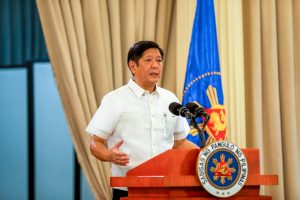Ferdinand Marcos Jr. will mark his first month as president of the Philippines on July 30. If his performance in the past month has been a glimpse of his leadership for the next six years, we can assume that his presidency will be substantially similar to that of his predecessor. Marcos is poised to continue the legacy of Rodrigo Duterte, minus the cursing and ranting when talking in public.
Among the first cabinet appointments made by Marcos were economists who also worked under the Duterte government. It is no surprise, therefore, that his economic platform, which he finally unveiled during his state of the nation address last week, made numerous references to the development plan of the previous government. He may be trying to assure local and foreign investors that he will not impose drastic changes when it comes to policies dealing with the business sector.
But Marcos will surely disappoint his supporters who expect him to quickly uplift the conditions of the poor after two years of reeling from the devastating impact of the pandemic. In his two major speeches since becoming president, he made no mention of wage hikes and controlling high fuel and food prices but he was consistent in discussing tax reforms and rationalizing the bureaucracy. He talked about revenue generation but not about wealth distribution. He enumerated several macroeconomic goals but he didn’t explain how real progress can be achieved by continuing the programs of the previous government, which relied heavily on debts and collecting higher taxes to finance mega infrastructure projects.
When he addressed the nation last Monday, Marcos impressed many with his seemingly comprehensive grasp of what needs to be done to revive the struggling economy. Compared to Duterte’s rambling style of talking, Marcos will easily stand out as more articulate. But without a prepared speech, Marcos has also sounded awkward in several press briefings over the past month. At one point, he even disagreed with the high inflation rate based on a report released by a government agency. In another briefing, he confused the public when he made incoherent remarks about the transportation crisis.
As expected, Marcos remained silent on other pressing social issues such as corruption, the peace process, and human rights abuses committed by the security forces. He did not discuss the estate tax owed by his family to the national treasury. Can he afford to be silent on these urgent matters for the next six years? Can he continue to whitewash the notorious reign of his father, who ruled the country as a dictator for two decades, by simply reviving the populist programs of the Martial Law era?
Marcos evaded many topics but he was most careful when talking about Duterte. He vowed to continue the previous government’s infrastructure projects but he stopped short of criticizing Duterte’s response to the COVID-19 pandemic. He blamed the country’s economic woes on external factors although he rejected the strict lockdown model which the Duterte government implemented in 2020 and 2021.
Marcos never mentioned Duterte’s pending investigation at the International Criminal Court for allegedly committing grave crimes against humanity. Marcos didn’t even discuss Duterte’s infamous “war on drugs” even if the former president had remained firm in his conviction that the drug menace is the principal cause of the conflict in society.
If Marcos needed to lay down his economic vision, he felt no compulsion to elaborate his peace and order doctrine. Similar to his economic team, most of the police and military generals advising him on national security have been Duterte appointees as well. The enforcers of the bloody campaigns against illegal drugs and the communist insurgency have been retained under the Marcos government. The new president tacitly endorsed Duterte’s machinery of terror by choosing to preserve the laws, policies, and inter-agency coordination in support of the local “wars” pursued by the previous government.
Marcos ended his public address by affirming that the state of the nation was “sound.” It is a ludicrous claim given the harsh impact of the economic and health crisis. He could be referring to the continuing dominance of political dynasties and the bright opportunities for the financiers of his presidential campaign. Like the previous state of the nation speeches, what matters more is not the hopeful narration of the president, but what the leader deliberately fails to acknowledge.

































